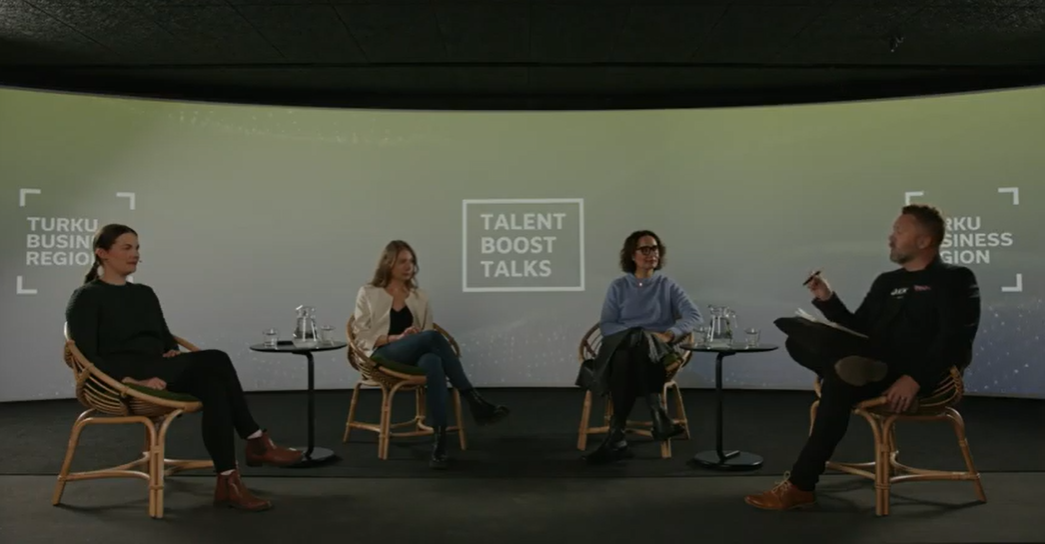Employer branding is a fairly new term and might still cause some confusion as to what it is and how companies can benefit from it.
Our latest Talent Boost Talks event focused on answering the question of what makes a successful global employer brand. We got to the bottom of it during the panel discussion with three HR professionals from If insurance, Valmet Automotive and Employer Branding Agency Emine.

So, what is employer branding?
The biggest misunderstanding is that employer branding means tactical recruitment campaigns. Most companies turn to employer branding when hiring becomes a struggle and finding the right workforce is difficult.
During the discussion, Susanna Rantanen from the Employer Branding Agency Emine pointed out that employer branding is a marathon, whereas recruitment marketing is the sprint.
“With employer branding you plant the seed that you harvest with recruitment”
– Susanna Rantanen, Employer Branding Agency Emine
At its best, employer branding doesn’t only help in hiring but it also helps the business to become more competitive on the market. A strong employer brand is comparable to a strong company brand in that it attracts customers and influences sales.
Employer branding is about creating the best employee experience and the best corporate culture, told Ira Silvendoin from Valmet Automotive. If one limits employer branding to hiring management, it limits the possibilities what one can achieve with it.
It is important to differentiate between employer branding, talent marketing and product marketing, stressed Tiina Vainio from If.

Who is or should be responsible for employer branding in companies?
Whether it is Marketing and Communications, Human Resources, or any other department, the department responsible for employer branding should understand the target audience, invest into learning about the audience and build a relationship with them, stressed Susanna.
The best marketing is very targeted, provides solutions and helps the customers understand how the company can help them.
This principle is true also for employer branding activities. In Valmet Automotive, for example, it is owned by Human Resources, but closely developed with the Marketing and Communication department.
“Top management needs to be committed”
– Ira Silvendoin, Valmet Automotive
Top management commitment to this topic varies between industries. The tech industry is in the forefront of the development, while more traditional industries are lagging behind.
Understanding the importance of the topic, as well as allocating a budget and resources to do the work is essential for successful employer branding, agreed the panellists.

How to build an international employer brand?
An international employer brand can be viewed from different perspectives. If it is about talent in countries where the company is active, one needs to adjust to the local requirements and environment.
“Attracting international talent in—or to—Finland is a whole different ballgame”, pointed out Susanna.
What Valmet Automotive likes to do, is to meet people in person. They go on road tours all over Finland, accompanied by representatives of the city of Uusikaupunki. “When you sell a job, you also sell a life in that city”, Ira stressed.
Internationals need much more support with settling into a new environment. Helping them with aspects of life not related to work, makes the employer much more attractive and increases the retention of new employees manyfold.
“A unified brand is recognisable globally”
– Tiina Vainio, If
Hiring internationals requires changes in company culture, communication, and onboarding.
It is not easy and requires compromises, told Tiina. If decided to build one unified global employer brand, with English being the working language of the IT department.

Where should a company interested in hiring internationals start from?
English as a working language is regarded as an international standard for any company wanting to employ internationals. Changing all internal communications to English is the basic starting point, which can be very hard, told Susanna.
Instead of changing all company operations into English, start with one team and build up from there, Susanna recommended. Using Finnish and English in the same message is also a good way of creating an inclusive working environment, added Tiina.
When building an employer brand, communicating about who you are is very important, so that people can get to know you, concluded the panellists.

“Talent Boost Talks: What makes a successful global employer brand” event was organised by Turku Chamber of Commerce, World Trade Center Turku and Turku Science Park Ltd and took place on November 2nd 2022. The panel discussion was moderated by Kimmo Laine from Heltti. Watch the whole event here. Read also how Spotify is attracting and retaining tech talents: ”Take care of the people you have”

